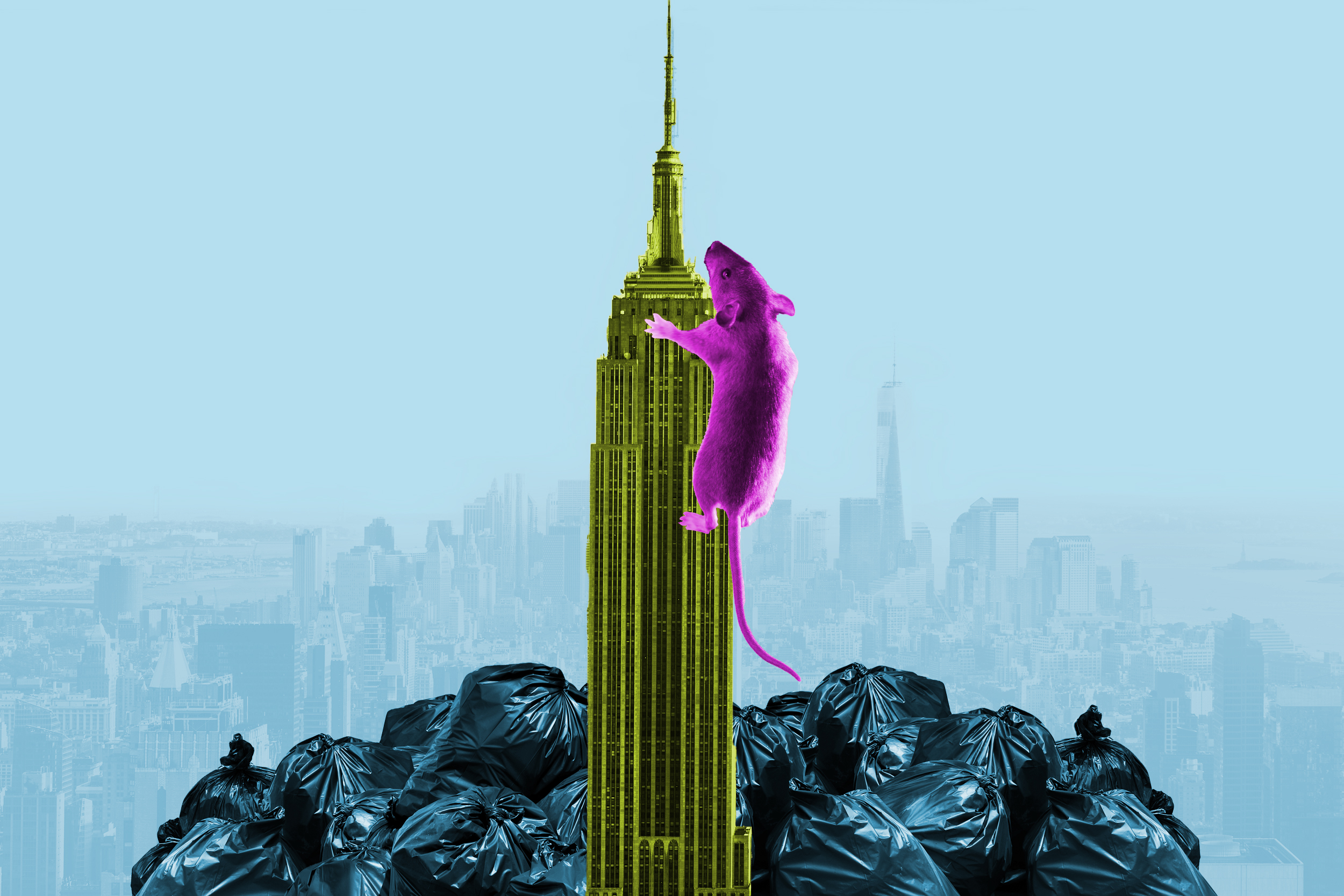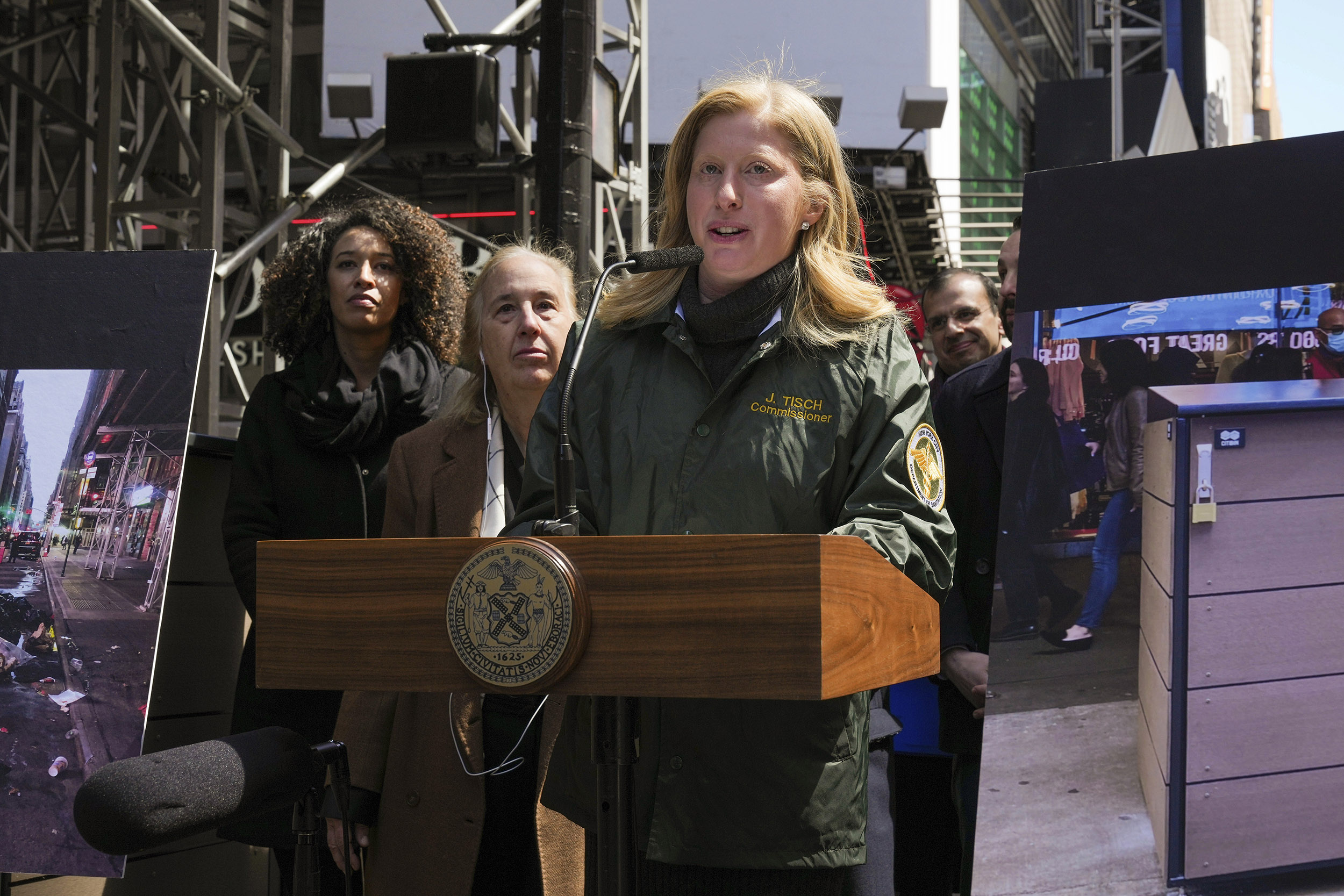
Photo illustration by Judy Blomquist/Harvard Staff
The rats are gonna hate this one too …
Jessica Tisch explains why being sanitation commissioner is a dream job — if you care about delivering essential services
Jessica Tisch was appointed New York City sanitation commissioner last April. In October, she announced new rules to reduce the time trash sits on the streets in an effort to tackle the city’s twin scourges of garbage and rats. In a press conference that made Tisch ’03, J.D. ’08, M.B.A. ’08, a social media star, she said, “The rats are going to hate this announcement. But the rats don’t run this city. We do.” The Gazette caught up with Tisch for an update.
Q&A
Jessica Tisch
GAZETTE: What have been the main challenges in your 10 months on the job?
TISCH: Most New Yorkers noticed that during the pandemic, New York City became meaningfully dirtier. In April of 2020, at the beginning of the pandemic, there were several budget cuts, and the cleaning function was largely defunded from the New York City Department of Sanitation. That meant that basic things like our service to clear out the litter basket or our service to sweep the street were all cut. When I took over last April, one of the first things we got to doing was restoring those basic bread-and-butter services. But we wanted to do more than restoring them. We wanted to run them at the highest levels of service that New York City has ever seen.
GAZETTE: What would you say are your main accomplishments so far?
TISCH: For decades, New Yorkers have set out their trash on the streets at 4 p.m., which is the earliest set-out time of any major city in the world, and historically, the Department of Sanitation hasn’t come to collect that trash until 6 a.m. That earned New York City the moniker of trash city. Twenty-four million pounds of residential trash put out on the curb every single day, and it sits there for 14 hours a day. We’ve worked with stakeholders to change that paradigm. Instead of setting out their trash at 4 p.m., the new rule starting April 1 will be to set out their trash at 8 p.m. if using a black bag, or 6 p.m. if using a bin. The Department of Sanitation is going to do our part by collecting more of that trash earlier. Instead of collecting it on the 6 a.m. shift, we’ll collect more of it on the midnight shift. By doing those two things, we intend to dramatically reduce the amount of time that trash sits on the curb in New York City.

Jessica Tisch speaks at a press conference about New York City’s first containerized waste bins in a commercial district.
AP photo
Another example is that we are rolling out universal curbside composting service in New York City. This will mean that over the next 20 months, we will offer all 8.5 million NYC residents weekly curbside collection of their food waste and their yard waste. We don’t want that stuff going to landfills, where it sits for years, releasing methane. Instead, we want to compost it and create soil or turn it into renewable energy. This is a massive commitment that the mayor has made that will divert more trash from landfills and further our sustainability goals. And another goal we’re implementing is to crack down on illegal dumping, which affects many neighborhoods in New York City. Historically, the city’s response to illegal dumping was, “We’ll just come and clean it up.” There were no real consequences for illegal dumpers, and that just encouraged people to dump on our neighborhoods. Over the past several months, we put up cameras and license plate readers in locations known for illegal dumping across the city. And what do you know? We started to catch illegal dumpers right and left. There are steep penalties. It’s a $4,000 fine; your vehicle gets impounded; and you have to pay the cost of cleanup. We finally have a strategy to diminish the amount of illegal dumping in New York City.
GAZETTE: How did your Harvard education help you prepare you for this job?
TISCH: I graduated from Harvard College in 2003. I came to work in city government in 2008, right after I graduated from Law School and Business School. All the three Harvard Schools taught me how to learn and how to think, more than anything else. I can rattle off different classes I took and how interesting the substance was, but overall, the real gift that Harvard gave me was the gift of thinking differently, which has very much helped me in my career because I’ve done things that I would have never anticipated or guessed I would ever do. If you had told me when I was in College or grad school that I would be working as the sanitation commissioner, I wouldn’t have believed it. I also wouldn’t have believed that I would run technology for the New York City Police Department, which I did before becoming sanitation commissioner. In all the jobs that I’ve had, I’ve had to process a lot of information and synthesize it to develop action plans or strategies. I would say that is what Harvard equipped me to do.
GAZETTE: What attracted you to city government?
TISCH: I’ve told people before that going to work in city government was certainly at the time not the most thoughtful decision I’ve ever made. But it is one of the great blessings of my life. I graduated from Law School and Business School during the financial crisis, and I was introduced to someone who worked in counterterrorism at the NYPD, and that sounded interesting to me. I can promise you I didn’t think it would lead to this, but I was open-minded. I wanted to do something interesting. I said to myself, “Let me try that out.” And then everything sort of flowed from there.
“The trash bags sitting on the curb for 14 hours a day serve as an all-you-can-eat-buffet for rats. We want to stop that all-you-can-eat-buffet or at the very least, reduce its hours of operation.”
GAZETTE: You have said that working as the sanitation commissioner is a dream job. Does it still feel that way?
TISCH: This is the job I have really dreamed of for quite some time. As I said, not as a student. I can’t trace it back to when I was a student in College. But certainly, for the past decade in my professional career, being the sanitation commissioner has been a dream job.
We have trucks, we have trash, we have rats. We have all those things, but I think what makes sanitation an enormous opportunity for me is that I like delivering essential services. I look at New Yorkers as our customers and managing 24 million pounds of trash a day, if you think about it, it’s the central service. If we don’t do our job one day, all 8.5 million New Yorkers notice it. If we don’t do our job for two or three days, that’s a public health crisis. If you look at the fire department, for example, and God bless the fire department; they’re heroes. But your average New Yorker goes through their entire life, if they’re lucky, without ever having to rely on the fire department’s services, and your average New Yorker every single day must rely on the sanitation department’s services. In my opinion, there are huge opportunities to innovate and be strategic and modernize at the Department of Sanitation. If you look around the world, many cities over the past 10 or 15 years have really innovated in this space. We have an enormous opportunity right now to rethink how we manage trash in New York City and how we clean the place up.
GAZETTE: Could you give us an update on your fight against rats in NYC?
TISCH: There are two major things that we are putting into effect to address the rat problem in NYC. The first I mentioned before is minimizing the amount of time the trash sits on the curb. We know that one-third of all the trash in the trash bags is basically rat food, food waste. The trash bags sitting on the curb for 14 hours a day serve as an all-you-can-eat-buffet for rats. We want to stop that all-you-can-eat-buffet or at the very least, reduce its hours of operation. The work that we’ve done will make over time a meaningful difference in the amount of rat food that’s available. The second is the curbside composting program, getting the food out of the black bags entirely.
GAZETTE: You became a social media sensation when you announced the new pick-up trash rules saying that the rats were going to hate that announcement. Do you have a new announcement for the rats?
TISCH: All the things that I just mentioned are new programs to tackle the rat problem and really go after rats in New York City. We announced two weeks ago the universal curbside composting service, and in about a month’s time, the set-out time for trash will change after a decade. These changes were hard to do, but we’ve done the work over the past several months to plan for them and implement them, and now they’re going to start to roll out. I’m looking forward to that.
GAZETTE: I guess the rats are going to hate this announcement too …
TISCH: (Laughs)






